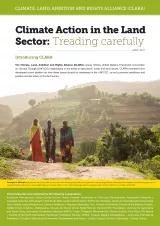Climate Action in the Land Sector: Treading Carefully - CLARA group briefing for climate negotiators
Climate action must be urgently scaled up to limit global warming. Action in the land sector is critical and necessary for achieving the Paris Agreement’s goal of limiting planetary warming to 1.5° or well below 2°C above pre-industrial levels.
The land sector is already playing an increasingly important role in climate action. Poor land use practices can and have caused massive releases of greenhouse gases (GHGs) from carbon stocks. Good practice is essential to limit further releases, and to protect and increase the existing carbon storage capacity of the land sector.
Parties must remember, however, that land serves multiple functions – providing food, homes, habitats, water, livelihoods, and much more. These must all be taken into consideration, or else biodiversity and human rights – such as food security and the land rights of rural communities and indigenous peoples – will suffer. The principles in the preamble to the Paris Agreement, including safeguarding food security and respecting human rights, must be operationalised and fully integrated into all policies relating to land.
The Paris Agreement further emphasises building adaptation and resilience to anticipated climate change. Nowhere is this more important than agriculture, which is particularly susceptible to climate impacts.
Land use must therefore be considered carefully as countries come together with international bodies, civil society organisations and other interested parties, to agree the rules and methods that will be used to turn the Paris Agreement into effective, achievable action.
The Climate, Land, Ambition and Rights Alliance (CLARA) calls on parties to tread carefully as they consider strategies for climate action in the land sector, and argues that they must:
Ensure:
- Food security and human rights;
- Free, prior and informed consent (FPIC) and full and effective participation of indigenous peoples and local communities at all stages - including from the project planning and design phase;
- Halting of deforestation and degradation, and protection and restoration of degraded forests and ecosystems;
- Security of land rights, including collective land rights;
- Counting of emissions from the burning of biomass;
- Reduction of non-carbon dioxide (CO2) emissions from industrialised agriculture systems, such as methane (CH4) and nitrous oxide (N2O);
- Agro-ecological approaches for agricultural adaptation strategies;
- A scaling-up of climate finance and addressing the particularly large gap in adaptation finance.
Avoid:
- Attempts to use terrestrial carbon sinks to offset fossil carbon emissions;
- Unreliable accounting for soil carbon removals;
- Harmful geo-engineering experiments or large-scale land use for Bioenergy with Carbon Capture and Storage (BECCS);
- Strategies that increase the risk of forced land acquisitions from indigenous peoples and local communities;
- Counterproductive “Climate Smart Agriculture” approaches.
This policy brief explains how and why Post-Paris climate negotiations can and should build effective climate action, without threatening human rights and natural ecosystems.
Introducing the CLARA group:
The Climate, Land, Ambition and Rights Alliance (CLARA) closely follows United Nations Framework Convention on Climate Change (UNFCCC) negotiations in the areas of agriculture, forest and land issues. CLARA members have developed a joint position on how these issues should be addressed in the UNFCCC, so as to promote ambitious and positive climate action in the land sector.
